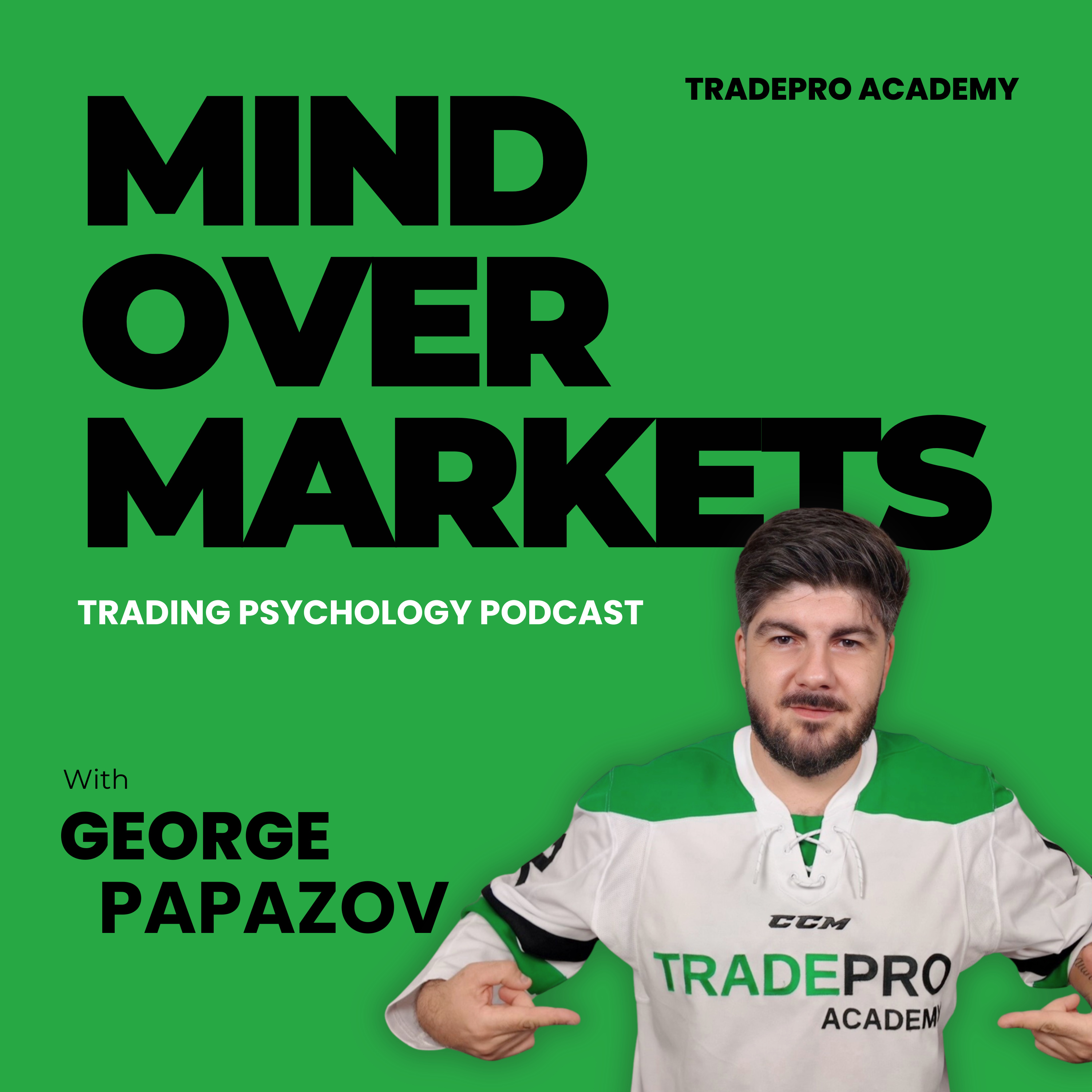

Mind Over Markets: Trading Psychology Podcast
George Papazov
Mind Over Markets is the trading psychology podcast for serious traders ready to master the real edge — their mind. Hosted by George Papazov, founder of TRADEPRO Academy, this show helps you break emotional loops, regulate impulses, and build a confident trader identity. Learn how to rewire your mindset using NLP, coaching, and performance psychology. Ready to go deeper? Unlock the full ASCEND psychology program inside TRADEPRO Academy.
Episodes
Mentioned books

Jan 9, 2025 • 1h 1min
Trading on the Move: Insights from a Nomadic Lifestyle
In this engaging podcast episode, George and Vicky explore the unique lifestyle of a traveling trader. They discuss the realities and challenges of trading while on the move, share memorable experiences from their travels, and emphasize the importance of discipline and routine in maintaining trading success. The conversation also delves into the technology and setups […]

Jan 2, 2025 • 1h 6min
Navigating the New Trading Landscape (with Mod Fady Ayad)
In this episode, Victorio and Fady discuss the evolving landscape of trading, focusing on how new traders can navigate the market more effectively today compared to the past. They explore the importance of systematic approaches, the psychological aspects of trading, and the significance of timing and market conditions. The conversation also highlights the advantages […]

Dec 19, 2024 • 1h 1min
Mike Schwartz: Mastering Your Trading Journey
Mike Schwartz, a seasoned trader from TradePro Academy, shares his journey through the complexities of order flow and auction market theory. He emphasizes the significance of developing a personalized trading style and mastering one skill at a time for consistency. The conversation highlights the challenges of trading on high volatility days like Fed Days and offers insights on effective risk management strategies. Mike underscores how journaling can improve trading performance and advises new traders to embrace trial and error in their development.

Dec 12, 2024 • 1h 12min
The Reality of Trading Expectations
The conversation dives into the unrealistic expectations new traders often hold, with 70% quitting within a year. It emphasizes the importance of discipline and routine as crucial factors for success. The transition from sim trading to live trading can lead to false confidence, making risk management vital. Community support is highlighted as essential for growth, while accepting losses is portrayed as part of the learning process. Ultimately, the discussion stresses the significance of setting realistic expectations and a continuous journey of self-improvement.

Dec 5, 2024 • 52min
We’re Back… Again (For Good This Time)
In this episode of the Trade Pro Academy podcast, George and Vicky discuss the evolution of their trading journey, the importance of psychology in trading, and the reintroduction of their podcast. They emphasize the need for structured trading systems, the role of community in achieving success, and the impact of market sessions on trading strategies. […]

Jun 20, 2024 • 10min
Farewell, For Now…
We’ve come a really, really long way. But we need to take a break to re-think the podcast and come back stronger than ever, with more engaging and relevant content. In this final (for now) episode I’m gonna explain to you the reasoning behind this decision and how to get more value from us in […]

Jun 13, 2024 • 31min
Top 10 Trading Psychology Questions Answered
Explore strategies for managing fear and anxiety, maintaining discipline, handling losses, avoiding emotional influences like greed, and building mental resilience in trading. Dive into techniques for personal development, self-awareness, mental toughness, motivation, and navigating psychological pitfalls in trading.

Jun 6, 2024 • 22min
Trading Hypnosis to Clear Emotion and Mindset
In today’s episode, we delve into the world of trading psychology and explore a powerful tool that can help you maintain your calm, focus, and rational thinking throughout the trading day—hypnosis. Key Topics Discussed: Recognizing Critical Moments in Trading: Have you ever found yourself on the verge of compromising your trading plan, knowing that by […]

May 30, 2024 • 20min
Adjusting to Summer Market Trading Conditions
Episode Description: In this episode, we delve into strategies to navigate the slower summer trading season effectively. After a brief apology for missing last week’s episode due to travel, we dive into how election years typically influence market behavior, with a focus on the expected drop in volatility this summer. Here’s a breakdown of what […]

May 16, 2024 • 38min
Breaking the Trader Cycle of Self-Sabotage (Part 2)
Delve into the subconscious behaviors that lead to self-sabotage like unresolved traumas, perfectionism, and lack of self-awareness. Explore how past experiences can instill a fear of success, the impact of perfectionism on progress, and the importance of self-awareness in breaking self-sabotaging patterns.


